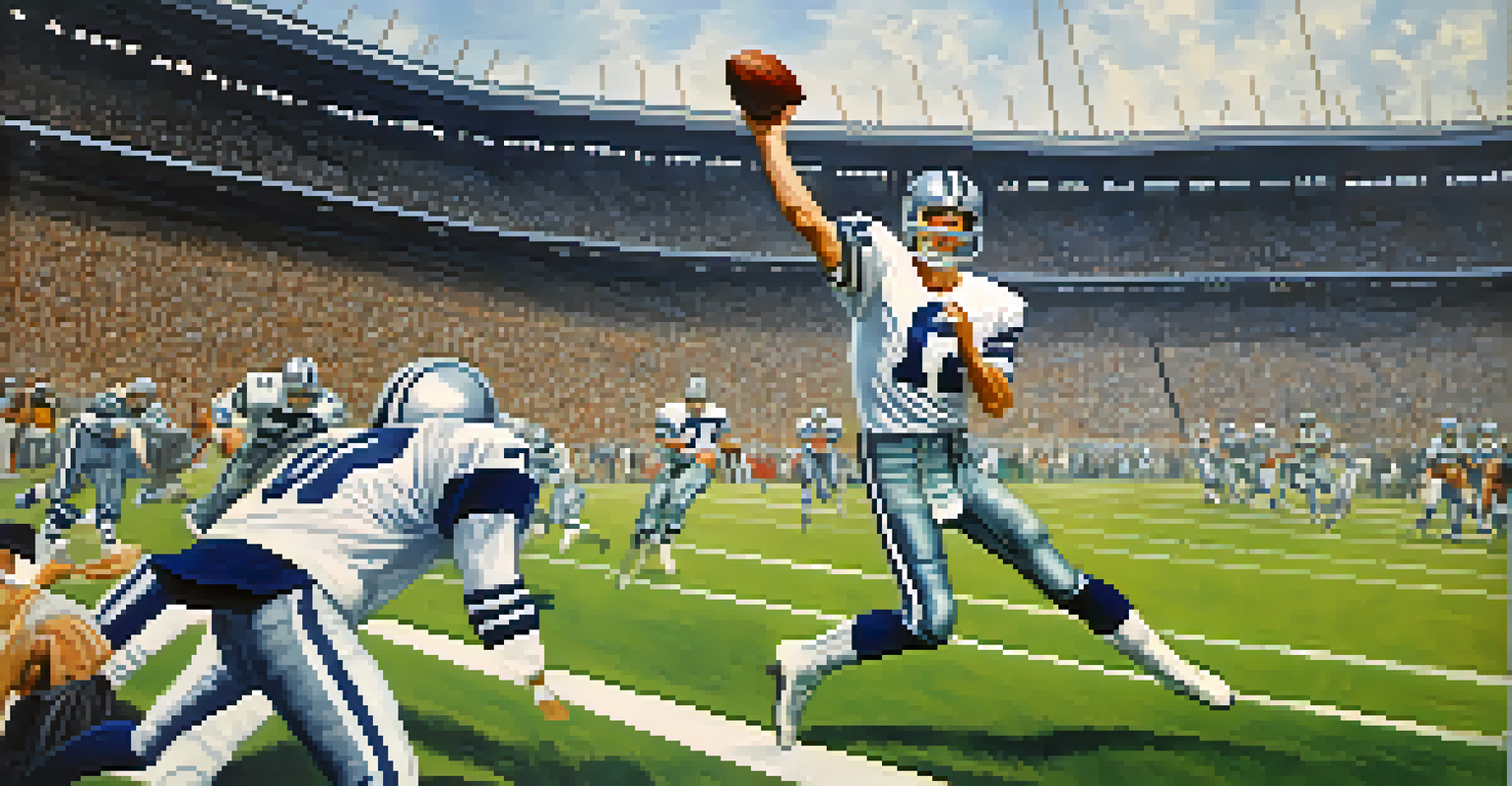The Birth of the Dallas Cowboys: A Sports Revolution

The Humble Beginnings of the Cowboys Franchise
The Dallas Cowboys were established in 1960, led by founder Clint Murchison Jr. Starting as an expansion team in the NFL, they faced skepticism in a city where football was still finding its footing. The team’s inaugural season was rocky, with a record of 0-11-1, but this only fueled their determination to grow.
Success is no accident. It is hard work, perseverance, learning, studying, sacrifice, and most of all, love of what you are doing or learning to do.
Murchison, a businessman with a vision, believed in the potential of Dallas as a football market. His investment and passion attracted local talent and fans, laying the groundwork for what would become one of the most iconic franchises in sports history. The Cowboys were determined to showcase that Texas could support a professional football team.
Despite early struggles, the Cowboys' resilience caught the attention of the community. With each game, they began to form a loyal fan base, setting the stage for their eventual rise in the league. This foundation of support was crucial for the team's future successes.
Building the Team: Key Players and Coaches
The Cowboys’ transformation began with the hiring of head coach Tom Landry in 1960. Landry, a former player and innovative strategist, introduced a disciplined approach that emphasized teamwork and skill. His vision would prove pivotal as he molded the franchise into a competitive force.

Landry's leadership attracted talented players like quarterback Don Meredith and running back Don Perkins, who became the backbone of the early teams. Their contributions showcased the potential of the Cowboys, and with each season, the team grew stronger and more cohesive. It was a perfect blend of strategy and talent that started turning heads in the NFL.
Cowboys' Resilience Fuels Success
Despite early struggles, the Cowboys' determination and the support of their community laid the foundation for their rise in the NFL.
As the team evolved, Landry's coaching philosophy and the players' determination set the Cowboys apart. Their commitment to excellence created a winning culture, fostering a sense of pride and identity that resonated deeply with fans. This era laid the groundwork for future championships and a legacy that would define the franchise.
The Rise to Prominence: Championship Aspirations
By the mid-1970s, the Cowboys had become a formidable force in the NFL. They reached their first Super Bowl in 1971, showcasing their talent on a national stage. Although they lost to the Baltimore Colts, this appearance marked a significant milestone in their journey and ignited hopes for future success.
The only way to prove that you are a good sport is to lose.
The team's perseverance paid off when they returned to the Super Bowl in 1977, clinching their first championship against the Denver Broncos. This victory not only validated their hard work but also solidified the Cowboys' reputation as 'America's Team.' Fans across the nation rallied behind them, making the team a cultural phenomenon.
The Cowboys continued to build on their success, with players like Roger Staubach and Tony Dorsett becoming household names. Their ability to perform under pressure and deliver thrilling games captivated audiences, making the Cowboys a staple in American sports history. This era marked the beginning of a dynasty that would shape the future of football.
Cultural Impact: Cowboys as a National Icon
The Dallas Cowboys transcended sports, becoming a symbol of American culture in the 1970s and 1980s. Their blue and silver colors, along with the iconic star logo, were recognized nationwide. The Cowboys' success stories and high-profile players contributed to their image as a glamorous franchise.
As the team continued to win championships, they captured the hearts of fans beyond Dallas. The Cowboys' story was one of resilience and triumph, resonating with people from all walks of life. This connection helped them cultivate a dedicated fan base that remains passionate to this day.
Cultural Icon of American Football
The Dallas Cowboys transcended sports, becoming a symbol of American culture and a beloved franchise nationwide.
The Cowboys also embraced entertainment, with cheerleaders and halftime shows that made games a complete experience. This unique blend of sports and showmanship set trends in the NFL and influenced how teams engaged with their fans. The Cowboys became more than a team; they were a phenomenon.
Innovations in Football: Pioneering Strategies
The Cowboys were not only successful on the field but also revolutionized football strategies. Under Tom Landry, they implemented the 'Flex Defense,' a tactical innovation that focused on adaptability and versatility. This approach allowed them to counter opposing offenses effectively and set the standard for future defensive strategies.
Landry’s emphasis on preparation and discipline taught players the importance of mental toughness. His systematic approach to game planning and player development elevated the Cowboys' performance to new heights. This focus on strategy and execution became a blueprint for other teams looking to replicate their success.
The Cowboys' innovations in training and gameplay also influenced how future generations approached the sport. Their commitment to excellence and adaptation to changing dynamics in football laid a foundation for the modern game. This legacy of innovation solidified their place not just in sports history, but in the evolution of football itself.
Challenges and Resilience: Facing Adversity
Despite their successes, the Cowboys faced significant challenges over the years. Injuries, tough competition, and management changes tested the team's resilience. However, the Cowboys demonstrated an unwavering spirit, often bouncing back stronger after setbacks, embodying the essence of a competitive sports franchise.
One notable challenge came in the 1980s when the team experienced a decline after their championship run. This period of struggle forced the organization to reevaluate its strategies and recruit fresh talent. The Cowboys' ability to adapt and refocus was crucial in their eventual resurgence in the 1990s.
Innovative Strategies Set Standards
Under Tom Landry, the Cowboys revolutionized football strategies, influencing how future generations approached the game.
The team's perseverance through adversity has become a defining characteristic of the Cowboys' legacy. Their ability to overcome obstacles has inspired fans and players alike. This narrative of resilience continues to resonate, reminding everyone that success often comes after facing and overcoming challenges.
The Legacy of the Dallas Cowboys: A Lasting Influence
Today, the Dallas Cowboys are considered one of the most valuable franchises in sports history. Their impact on the NFL, from fan engagement to marketing strategies, has set benchmarks for teams across the league. The Cowboys' brand remains strong, with millions of fans worldwide continuing to support them.
The team's influence extends beyond the field; they have fostered a community of fans who share a deep connection to the franchise. Events like training camps and fan days create opportunities for the Cowboys to interact with their supporters, strengthening that bond. This engagement has helped cultivate a loyal following that spans generations.

The legacy of the Dallas Cowboys is a testament to their role in shaping sports culture in America. From their innovative strategies to their cultural impact, the Cowboys have left an indelible mark on professional football. As they continue to evolve, their story remains a source of pride and inspiration for fans everywhere.